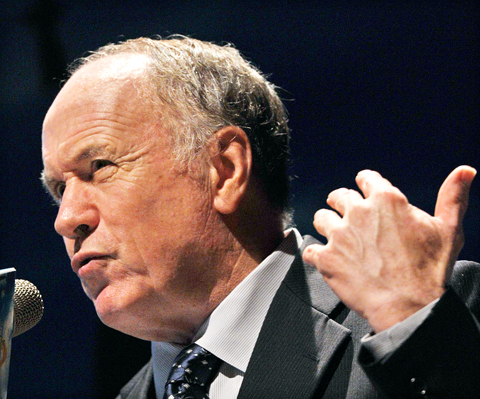The US economy is bottoming out, but it has yet to recover and is likely to experience a period of stagnation until the country reduces its debt, US Nobel prize-winning economist Edward Prescott said in Taipei yesterday.
Prescott, currently a senior adviser to the US Federal Reserve Bank in Minneapolis, said the US financial crisis is a symptom, but not the cause, of the recent economic downturn.
“The good news is that the US economy is bottoming out after having contracted for 17 months,” the economist told a forum on international economy and finance.

PHOTO: CNA
However, Prescott said the world’s largest economy is not recovering and that it may head toward stagnation until it adopts measures to cut public expenditure and boost productivity.
Prescott voiced concern that the US may experience “a lost decade” like Japan, with almost zero economic growth following a real estate bubble in the 1990s.
The high unemployment rate in the US shows that productivity and market value have fallen, said Prescott, a heavyweight figure in the theories of business cycles and general equilibrium.
He has said the current population survey (CPS) of working hours, a gauge of the labor force, is a better indicator of the country’s output than GDP because the former data is released monthly and does not require much revision.
Despite its lackluster performance in recent years, the US remains the world’s major consumer of Taiwanese-made electronics and its main economic data continues to serve as bellweather of local tech firms’ prospects.
Prescott expressed more optimism on China’s sustained economic growth, saying the emerging economy may overtake the US in a few years after becoming the world’s second-largest economy this year.
The Nobel laureate said he was also impressed at the pace of Taiwan’s economic recovery and lauded the government for cutting the corporate income tax rate.
Lower tax rates and deregulation are key to spurring growth, he said, adding that governments should not erect barriers to free trade to boost productivity, as such moves only benefit special interest groups.

A proposed 100 percent tariff on chip imports announced by US President Donald Trump could shift more of Taiwan’s semiconductor production overseas, a Taiwan Institute of Economic Research (TIER) researcher said yesterday. Trump’s tariff policy will accelerate the global semiconductor industry’s pace to establish roots in the US, leading to higher supply chain costs and ultimately raising prices of consumer electronics and creating uncertainty for future market demand, Arisa Liu (劉佩真) at the institute’s Taiwan Industry Economics Database said in a telephone interview. Trump’s move signals his intention to "restore the glory of the US semiconductor industry," Liu noted, saying that

On Ireland’s blustery western seaboard, researchers are gleefully flying giant kites — not for fun, but in the hope of generating renewable electricity and sparking a “revolution” in wind energy. “We use a kite to capture the wind and a generator at the bottom of it that captures the power,” said Padraic Doherty of Kitepower, the Dutch firm behind the venture. At its test site in operation since September 2023 near the small town of Bangor Erris, the team transports the vast 60-square-meter kite from a hangar across the lunar-like bogland to a generator. The kite is then attached by a

Foxconn Technology Co (鴻準精密), a metal casing supplier owned by Hon Hai Precision Industry Co (鴻海精密), yesterday announced plans to invest US$1 billion in the US over the next decade as part of its business transformation strategy. The Apple Inc supplier said in a statement that its board approved the investment on Thursday, as part of a transformation strategy focused on precision mold development, smart manufacturing, robotics and advanced automation. The strategy would have a strong emphasis on artificial intelligence (AI), the company added. The company said it aims to build a flexible, intelligent production ecosystem to boost competitiveness and sustainability. Foxconn

Leading Taiwanese bicycle brands Giant Manufacturing Co (巨大機械) and Merida Industry Co (美利達工業) on Sunday said that they have adopted measures to mitigate the impact of the tariff policies of US President Donald Trump’s administration. The US announced at the beginning of this month that it would impose a 20 percent tariff on imported goods made in Taiwan, effective on Thursday last week. The tariff would be added to other pre-existing most-favored-nation duties and industry-specific trade remedy levy, which would bring the overall tariff on Taiwan-made bicycles to between 25.5 percent and 31 percent. However, Giant did not seem too perturbed by the